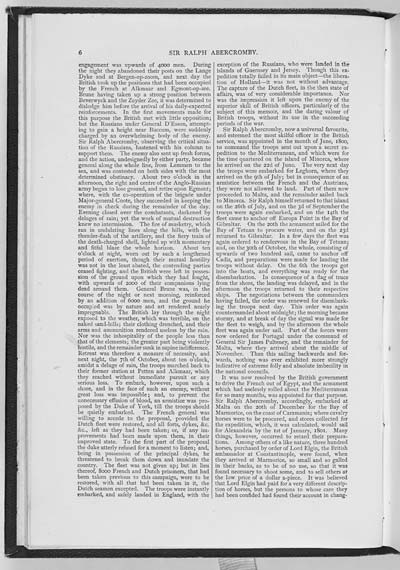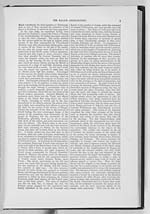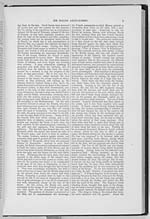6
engagement was upwards of 4000 men. During
the night they abandoned their posts on the Lange
Dyke and at Bergen-op-zoom, and next day the
British took up the positions that had been occupied
by the French at Alkmaar and Egmont-op-zee.
Brune having taken up a strong position between
Beverwyck and the Zuyder Zee, it was determined to
dislodge him before the arrival of his daily-expected
reinforcements. In the first movements made for
this purpose the British met with little opposition;
but the Russians under General D'Esson, attempt-
ing to gain a height near Buccum, were suddenly
charged by an overwhelming body of the enemy.
Sir Ralph Abercromby, observing the critical situa-
tion of the Russians, hastened with his column to
support them. The enemy also sent up fresh forces,
and the action, undesignedly by either party, became
general along the whole line, from Lemmen to the
sea, and was contested on both sides with the most
determined obstinacy. About two o'clock in the
afternoon, the right and centre of the Anglo-Russian
army began to lose ground, and retire upon Egmont;
where, with the co-operation of the brigade under
Major-general Coote, they succeeded in keeping the
enemy in check during the remainder of the day.
Evening closed over the combatants, darkened by
deluges of rain; yet the work of mutual destruction
knew no intermission. The fire of musketry, which
ran in undulating lines along the hills, with the
thunder-flash of the artillery, and the fiery train of
the death-charged shell, lighted up with momentary
and fitful blaze the whole horizon. About ten
o'clock at night, worn out by such a lengthened
period of exertion, though their mutual hostility
was not in the least abated, the contending parties
ceased fighting, and the British were left in posses-
sion of the ground upon which they had fought,
with upwards of 2000 of their companions lying
dead around them. General Brune was, in the
course of the night or next morning, reinforced
by an addition of 6000 men, and the ground he
occupied was by nature and art rendered nearly
impregnable. The British lay through the night
exposed to the weather, which was terrible, on the
naked sand-hills; their clothing drenched, and their
arms and ammunition rendered useless by the rain.
Nor was the inhospitality of the people less than
that of the elements; the greater part being violently
hostile, and the remainder sunk in supine indifference.
Retreat was therefore a measure of necessity, and
next night, the 7th of October, about ten o'clock,
amidst a deluge of rain, the troops marched back to
their former station at Petten and Alkmaar, which
they reached without immediate pursuit or any
serious loss. To embark, however, upon such a
shore, and in the face of such an enemy, without
great loss was impossible; and, to prevent the
unnecessary effusion of blood, an armistice was pro-
posed by the Duke of York, till the troops should
be quietly embarked. The French general was
willing to accede to the proposal, provided the
Dutch fleet were restored, and all forts, dykes, &c.
&c., left as they had been taken; or, if any im-
provements had been made upon them, in their
improved state. To the first part of the proposal
the duke utterly refused for a moment to listen; and,
being in possession of the principal dykes, he
threatened to break them down and inundate the
country. The fleet was not given up; but in lieu
thereof, 8000 French and Dutch prisoners, that had
been taken previous to this campaign, were to be
restored, with all that had been taken in it, the
Dutch seamen excepted. The troops were instantly
embarked, and safely landed in England, with the
exception of the Russians, who were landed in the
islands of Guernsey and Jersey. Though this ex-
pedition totally failed in its main object�the libera-
tion of Holland�it was not without advantage.
The capture of the Dutch fleet, in the then state of
affairs, was of very considerable importance. Nor
was the impression it left upon the enemy of the
superior skill of British officers, particularly of the
subject of this memoir, and the daring valour of
British troops, without its use in the succeeding
periods of the war.
Sir Ralph Abercromby, now a universal favourite,
and esteemed the most skilful officer in the British
service, was appointed in the month of June, 1800,
to command the troops sent out upon a secret ex-
pedition to the Mediterranean, and which were for
the time quartered on the island of Minorca, where
he arrived on the 22d of June. The very next day
the troops were embarked for Leghorn, where they
arrived on the 9th of July; but in consequence of an
armistice between the French and the Austrians,
they were not allowed to land. Part of them now
proceeded to Malta, and the remainder sailed back
to Minorca. Sir Ralph himself returned to that island
on the 26th of July, and on the 3d of September the
troops were again embarked, and on the I4th the
fleet came to anchor off Europa Point in the Bay of
Gibraltar. On the 2Oth the armament sailed for the
Bay of Tetuan to procure water, and on the 23d
returned to Gibraltar. In a few days the fleet was
again ordered to rendezvous in the Bay of Tetuan;
and, on the 30th of October, the whole, consisting of
upwards of two hundred sail, came to anchor off
Cadiz, and preparations were made for landing the
troops without delay. On the 6th the troops got
into the boats, and everything was ready for the
disembarkation. In consequence of a flag of truce
from the shore, the landing was delayed, and in the
afternoon the troops returned to their respective
ships. The negotiations between the commanders
having failed, the order was renewed for disembark-
ing the troops next day. This order was again
countermanded about midnight; the morning became
stormy, and at break of day the signal was made for
the fleet to weigh, and by the afternoon the whole
fleet was again under sail. Part of the forces were
now ordered for Portugal under the command of
General Sir James Pulteney, and the remainder for
Malta, where they arrived about the middle of
November. Than this sailing backwards and for-
wards, nothing was ever exhibited more strongly
indicative of extreme folly and absolute imbecility in
the national councils.
It was now resolved by the British government
to drive the French out of Egypt, and the armament
which had uselessly rolled about the Mediterranean
for so many months, was appointed for that purpose.
Sir Ralph Abercromby, accordingly, embarked at
Malta on the 2Oth of December for the Bay of
Marmorice, on the coast of Caramania; where cavalry
horses were to be procured, and stores collected for
the expedition, which, it was calculated, would sail
for Alexandria by the 1st of January, 1801. Many
things, however, occurred to retard their prepara-
tions. Among others of a like nature, three hundred
horses, purchased by order of Lord Elgin, the British
ambassador at Constantinople, were found, when
they arrived at Marmorice, so small and so galled
in their backs, as to be of no use, so that it was
found necessary to shoot some, and to sell others at
the low price of a dollar a-piece. It was believed
that Lord Elgin had paid for a very different descrip-
tion of horses, but the persons to whose care they
had been confided had found their account in chang-�

![]() Universal Viewer |
Universal Viewer | ![]() Mirador |
Large image | Transcription
Mirador |
Large image | Transcription
![]()

